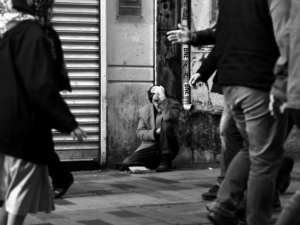
Cross Over to the Other Side
For Christians, the word ‘cross’ symbolises the centrepiece of our faith. However, it is also a verb which denotes an action, a definite and deliberate

Stephen McQuoid is the General Director of GLO Europe and has a passion for reaching secular Europeans with the gospel. He is also an elder at Liberty Community Church in Bellshill and combines this with an itinerant teaching and training ministry both in the UK and abroad. He is married with three children.
One of the dangers we face as modern evangelicals is the temptation to think that God didn’t do very much in the world until we arrived. The truth is, however, there have always been heroes of the faith and we have much to learn from them.
This is certainly the case when it comes to world mission. Christian mission did not begin with William Carey or Anthony Norris Groves. Rather it is a continuing story that has run since New Testament times. Take, for example, the remarkable St. Patrick, who never had the opportunity to study missiology at an evangelical seminary, but was one of the most thoughtful, creative and dynamic missionaries of church history.
Much to my Irish blushes, Patrick was actually born in England in 389AD. His life took a distressing turn when at the age of 16, some Irish tribes invaded his homeland and he was trafficked to Ireland where he lived for six years as a slave. He managed to escape this miserable existence by smuggling himself over to France. There two things happened which were to change the course of his life. Firstly, he became a monk and secondly, he developed a heart for mission and for the conversion of the Irish.The later came as a result of a vision in which he was challenged to bring the love of God to his previous captors.
He returned to Ireland in A.D.432 and spent the next thirty years preaching until his death. There is a lot that we don’t know about Patrick’s story; what we do know is that he didn’t just fit in with the missionary rubric which the Roman Church had established. Rather, he was an innovator and contextualised the gospel long before that word was even invented. He was effective! At the beginning of his ministry the land was completely pagan but by the end Christianity had spread throughout the whole country.
…there have always been heroes of the faith and we have much to learn from them
Stephen McQuoid, General Director GLO Europe Tweet
It seems likely that he made Armagh his headquarters and that city remains a significant Christian centre to this day. What is certain is that his mission method was well thought out. His strategy was to motivate and train a group of monks who would be sent out to strategic areas to engage in evangelism. This methodology not only bore fruit in Ireland, but in Scotland too with the next generation of Celtic missionaries.
Being a missionary in Ireland was as hard then as it is now. The land was steeped in paganism which created a huge cultural and theological chasm which converts would have to cross. Ireland was also divided into kingdoms with each providing a whole new mission field. Moreover, frequent skirmishes with English raiders meant that sometimes converts were massacred in the clashes. None of this deterred the courageous Patrick.
What made Patrick a truly great missionary was his character combined with his missiological strategy. As far as his character was concerned, Patrick did not have the benefit of a good education and he was very conscious of his lack of theological competence. But what he lacked in theological expertise, he made up for in a single-minded devotion to Christ, living a spiritual existence in which meditation and dreams were a large part of his experience. He was also acutely aware of the reality of spiritual warfare, where good and evil collided in the battle for people’s souls.
This firebrand spirituality was married to a flexible missiology. By contrast to the Roman Church which advanced itself through power structures and political strategy, Patrick preferred his monks to win hearts through passion and piety. The Roman church was hierarchical, building impressive monasteries and beautiful churches all under the watchful eye of the Bishop. The Celts took a different approach. Their monks lived simple lives, living near the people in learning communities where the abbot would teach Scripture to his disciples who would make disciples of the people. They also gave space for the flourishing of art, believing that it was an expression of spirituality. Theirs was an experiential faith and not just an intellectual one. They also took their faith to the people rather than expecting the people to come to them. This incarnational approach contributed to their success.
The Celtic church grew like wildfire, first in Ireland, then Scotland and then working southwards into England and also parts of Europe. It could have become the official voice of Christianity except for one fatal mistake, that of a merger with Rome. At the Synod of Whitby in 664 the Roman and Celtic churches agreed to amalgamate. The Roman church had wealth and organisation which the Celtic church lacked and that acted as a blanket which eventually snuffed out the fire of Celtic spirituality.
While it no longer exists, the Celtic church and its enigmatic founder, Patrick, have a lot to teach us about mission. Be passionate and love Christ. Read the Scriptures believing they can transform you and your disciples. Live with the people, enjoy creativity and remember church is not about buildings. Engage in spiritual warfare and find tangible ways of expressing the Christian faith within the host culture. This is the stuff of contemporary missiology, though Patrick modelled it centuries ago!

For Christians, the word ‘cross’ symbolises the centrepiece of our faith. However, it is also a verb which denotes an action, a definite and deliberate
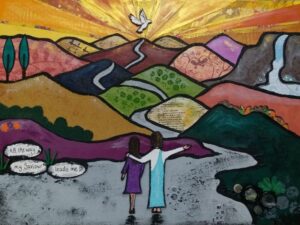
“Why not try to paint a picture based on your favourite hymn?” There are many hymns I love, so it’s always hard to choose a
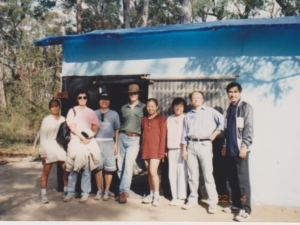
I was raised in a Christian family and was 12 when the Lord called my parents to missionary service. Seeing other countries and cultures was

“You’re not Irish!” he said with a derogatory smile on his face. I was confused, because I thought I was. Some might quip that it

What playlist have you planned to use this summer and what’s it called? Nowadays many of us use playlists on our phones or tablets to

Some words can provoke a reaction. I have sometimes spiced up a conversation with friends by dropping in a word that I know will be

What do you think is the greatest challenge for missionaries? Apparently it’s not necessarily the uncomfortable climate, the unfamiliar diet, the difficulties of language, the

Interesting times we live in! Even if you were alive for the last global pandemic, none of us have experienced anything like this before. The
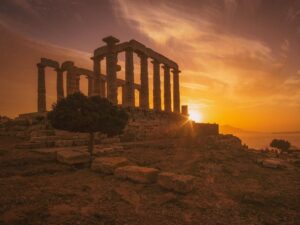
In this blog, let us think about how our strategies in mission compare with the early church in Acts. Here are two passages from Acts which

Standing one evening with my grandson, who was three years old at the time, we were gazing into the dark night sky. Trying to be

God’s call to us was progressive, slow and measured. Probably, in my case, it started when I was born to missionary parents who came from
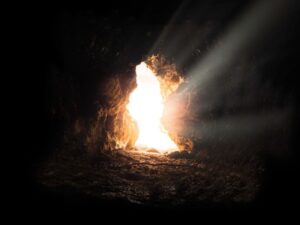
Coronavirus: the word on everyone’s lips and the fear in (almost) everyone’s hearts. Response to the pandemic has been mixed. We cannot fail to be

With every job description comes information about the task at hand: what have I to do? Who do I report to? What resources are available

What does it mean to waste life? This is a burning question that all human beings need to face as individuals. Many are wasting the

Being a missionary is not an occupation that many young people would consider these days. When I started as a missionary, there was no salary,

It was toward the end of 1989 when the Lord stopped me in my tracks. For years I had heard the gospel through a Christian

In Acts 8:26-35, we eavesdrop as Philip shares the Message of Jesus with a fellow-traveller. 1) Listening to God (8:26, 29) Philip was a person open

In my first blog I mentioned how important Christian camps have been to us as a family and especially to our two boys Josiah and Joseph.

What should our strategy for mission be?That’s a question many books and articles seek to grapple with. But whilst a lot of these strategies are

These were the remarkable words that Jesus said to his disciples. They’d seen that the crowd who were there to listen to Jesus were in
If you would like to receive information about our next events feel free to sign up to our mailing list.
© Copyright 2019 GLO Europe. All Rights Reserved | GLO-Europe is a charitable Trust based at 78 Muir Street, Motherwell, ML1 1BN.